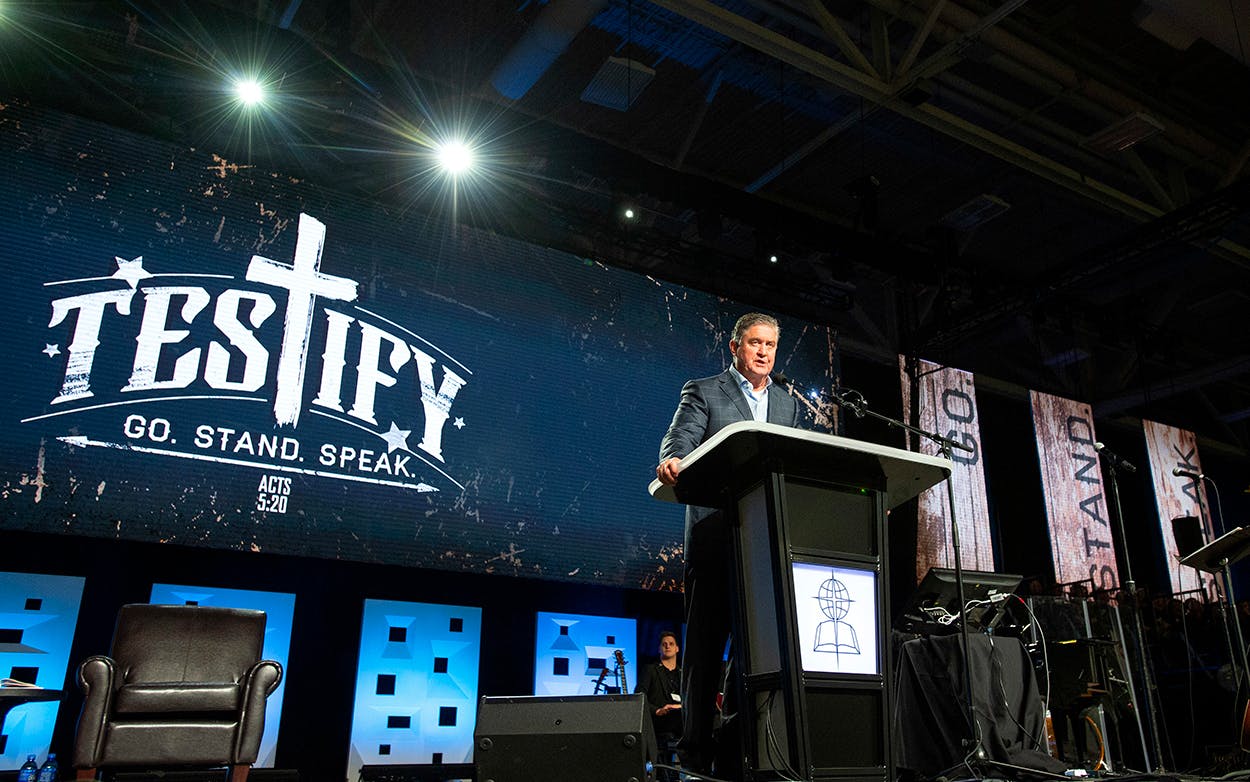Last week, U.S. Attorney General Jeff Sessions justified the Trump administration’s controversial new “zero tolerance” policy of prosecuting anybody who illegally crosses the U.S. border—the same policy that has separated children from their parents—by referencing the Bible. “I would cite you to the Apostle Paul and his clear and wise command in Romans 13, to obey the laws of the government because God has ordained the government for his purposes,” Sessions said during a speech in Indiana. “Orderly and lawful processes are good in themselves. Consistent and fair application of the law is in itself a good and moral thing, and that protects the weak and protects the lawful.”
At a press conference in Washington, D.C., shortly after Sessions’s statement, reporters questioned White House press secretary Sarah Huckabee Sanders about the biblical justification for breaking up families seeking asylum in the U.S. Although she wouldn’t specifically address the attorney general’s statement, Sanders told reporters, “It is very biblical to enforce the law. That is actually repeated a number of times throughout the Bible.”
Asked about biblical justification for separating children from parents, Press Sec. Sanders says, "It is very biblical to enforce the law." https://t.co/pypPFol1QR pic.twitter.com/qRzfYsBNuL
— ABC News (@ABC) June 14, 2018
Sessions’s and Sanders’s comments came just one day after the end of the annual Southern Baptist Convention—a group that likely knows a lot about the Bible. On June 12 and 13, nearly 10,000 members of the largest Protestant denomination in the U.S. gathered in Dallas and passed sixteen resolutions that in some ways represent where it stands on moral and social issues. The passage of “Resolution 5—On Immigration” was particularly pertinent. The measure lays out how Christians are supposed to treat immigrants (“with the same respect and dignity as those native born”), declares “that any form of nativism, mistreatment, or exploitation is inconsistent with the gospel of Jesus Christ” and—most notably—calls for “maintaining the priority of family unity” when it comes to immigration, citing Bible passages in support of the church’s pro-family stance.
The SBC’s new stance on immigration also cites the organization’s 2011 resolution “On Immigration And The Gospel,” which—referring to Romans 13:1-7, the same passage Sessions invoked—states that “Christians are under biblical mandate to respect the divinely-ordained institution of government and its just laws, that government has a duty to fulfill its ordained mandate, and that Christians have a right to expect the government to fulfill its ordained mandate to enforce those laws.”
Russell Moore, president of the SBC’s Ethics and Religious Liberty Commission, has a much different read on Romans 13 than Sessions.
“There is no Christian theologian that I’m aware of in any branch of the church in history who has held that Romans 13 justifies whatever a government decides to do as moral,” Moore says. “As a matter of fact, the Bible repeatedly condemns governments for doing wicked things. Romans 13 tells us that the governing authorities are set up by God but with a very limited purpose: to punish evildoers and to commend that which is good. No one can make the case that children fleeing dangerous persecution are evildoers. If anything, Romans 13 makes the opposite case from the one that the attorney general tried to make, which is that, in a democratic republic where the people are the ultimate governing authority, we have an accountability before God as to how we use the authority that’s being given. And turning the sword of the state against innocent children and splitting them up from their parents is indefensible.”
But not all theologians can speak in such absolutes. Evan Lenow, the associate director of ethics and director of the Land Center for Cultural Engagement at Southwestern Baptist Theological Seminary, attended last week’s convention, and he feels that there isn’t enough information about what’s happening on the border to determine whether it’s biblically ethical. “That’s my concern in all this. We hear part of the information, we don’t hear all the information and so it’s difficult to make a definitive statement,” Lenow says. “But I can say that we as Southern Baptists are pro-family, and we think that’s a biblical position. And we also believe that God has ordained the government to keep peace and order in society. That comes from Romans 13, which, as I understand, is what Attorney General Sessions was referencing. But somewhere in there, there’s a balance on this issue, and I think at the end of the day, that’s what we as Southern Baptists are thinking: where’s that balance? Where’s that balance of justice and compassion? Where’s that balance of law and order without losing the perspective of being a compassionate people?”
Like the fifteen others passed by Southern Baptists at this year’s convention, the immigration resolution is nonbinding. But Moore believes that Resolution 5’s passage (“virtually unanimously,” he notes) shows that members of the SBC are “united on the fact that the Bible tells us that all people are created in the image of God in their deity, and that includes our immigrant neighbors.”
Members and churches in the Southern Baptist community have the option to adopt the resolutions, but as president of the convention’s Ethics and Religious Liberty Commission, it’s Moore’s responsibility to at least ensure they hear the message. The commission’s other responsibilities include conveying the SBC’s resolutions to powerful people like Sessions in the hopes of influencing policy. “We’re going to continue to stand up for those who bear the image of God and speak to the consciences of those who lead this country.”








